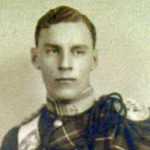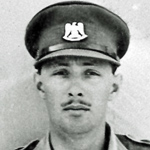11 Commando Commanders
Archive pages:
PEDDER, Richard Robert Newsham (Lt Col)
Rank:
Lieutenant Colonel
Unit / Base:
11 Commando
Regiment/Corps:
Highland Light Infantry (City of Glasgow Regiment)
Service:
Army
Number:
31724
Died :
Monday, June 9, 1941
Killed in action or died of wounds
Age:
36
Cemetery/Memorial:
Operations:
Lieutenant Colonel Richard Pedder, Officer Commanding No.11 (Scottish) Commando, was killed in action during operations at Litani River, Syria. Commissioned on 27 August 1924 he served with the Highland Light Infantry until the outbreak of war.
Son of Brigadier General Ernest Newsham Pedder and Mary Aloisa Pedder; husband of Pamela Anne Pedder.
Winston Churchill later wrote: "Their advance (referring to the Australians) was aided by a daring raid by No.11 Commando, which was landed from the sea behind the enemy lines.
In this devoted stroke the Commando lost its leader Colonel Pedder, and all its other officers were either killed or wounded, together with nearly 120 other ranks, or a quarter of its total strength."
Sources
CWGC.
Casualty Lists / National Archives file WO417/2.
[Image] His daughter Mrs Elisabeth Humphryes.
Primary Roll of Honour:
Photo of Commando in Gallery:
Yes
Photo of grave in Gallery:
Yes
Archive pages :
KEYES, Lt Col. Geoffrey Charles Tasker, VC
Rank:
Lieutenant Colonel
Unit / Base:
11 Commando
'Layforce'
Regiment/Corps:
Royal Scots Greys (2nd Dragoons), Royal Armoured Corps
Service:
Army
Number:
71081
Honours & Awards:
Died :
Tuesday, November 18, 1941
Killed in action or died of wounds
Age:
24
Cemetery/Memorial:
Lieutenant Colonel Geoffrey Keyes MC died during the commando raid on Rommel's HQ. Posthumously awarded the Victoria Cross. Son of Admiral of the Fleet Roger John Brownlow Keyes, G.C.B., K.C.V.O., C.M:G., D.S.O., A.D.C., 1st Baron Keyes, and of Lady Keyes (nee Bowlby), of Buckingham.
Formerly Captain of 2 troop, No 11 Commando, he was promoted Officer Commanding No 11 Commando after the death of Lt Col Pedder during the Litani River raid. It was during this raid that the then Captain Keyes was awarded the Military Cross.
Victoria Cross.
War Office, 19th June, 1942.
Lieutenant-Colonel Keyes commanded a detachment of a force which landed some 250 miles behind the enemy lines to attack Headquarters, Base Installations and Communications. From the outset Lieutenant-Colonel Keyes deliberately selected for himself the command of the detachment detailed to attack what was undoubtedly the most hazardous of these objectives—the residence and Headquarters of the General Officer Commanding the German forces in North Africa. This attack, even if initially successful, meant almost certain death for those who took part in it.
He led his detachment without guides, in dangerous and precipitous country and in pitch darkness, and maintained by his stolid determination and powers of leadership the morale of the detachment. He then found himself forced to modify his original plans in the light of fresh information elicited from neighbouring Arabs, and was left with only one officer and an N.C.O. with whom to break into General Rommel's residence and deal with the guards and Headquarters Staff.
At zero hour on the night of 17th-18th November, 1941, having despatched the covering party to block the approaches to the house, he himself with the two others crawled forward past the guards, through the surrounding fence and so up to the house itself. Without hesitation, he boldly led his party up to the front door, beat on the door and demanded entrance.
Unfortunately, when the door was opened, it was found impossible to overcome the sentry silently, and it was necessary to shoot him. The noise of the shot naturally aroused the inmates of the house and Lieutenant-Colonel Keyes, appreciating that speed was now of the utmost importance, posted the N.C.O. at the foot of the stairs to prevent interference from the floor above. Lieutenant-Colonel Keyes, who instinctively took the lead, emptied his revolver with great success into the first room and was followed by the other officer who threw a grenade. Lieutenant-Colonel Keyes with great daring then entered the second room on the ground floor but was shot almost immediately on flinging open the door and fell back into the passage mortally wounded. On being carried outside by his companions he died within a few minutes.
By his fearless disregard of the great dangers which he ran and of which he was fully aware, and by his magnificent leadership and outstanding gallantry, Lieutenant-Colonel Keyes set an example of supreme self sacrifice and devotion to duty.
Sources
Victoria Cross: London Gazette 35600, page 2699.
Military Cross: London Gazette 35316, page 6086.
[Image 1] Image © NMS/2012 National Museum Scotland.
[Image 2] Image © IWM (E 4732) Imperial War Museum.
Primary Roll of Honour:
Photo of Commando in Gallery:
Yes
Additional content:
Archive pages :

